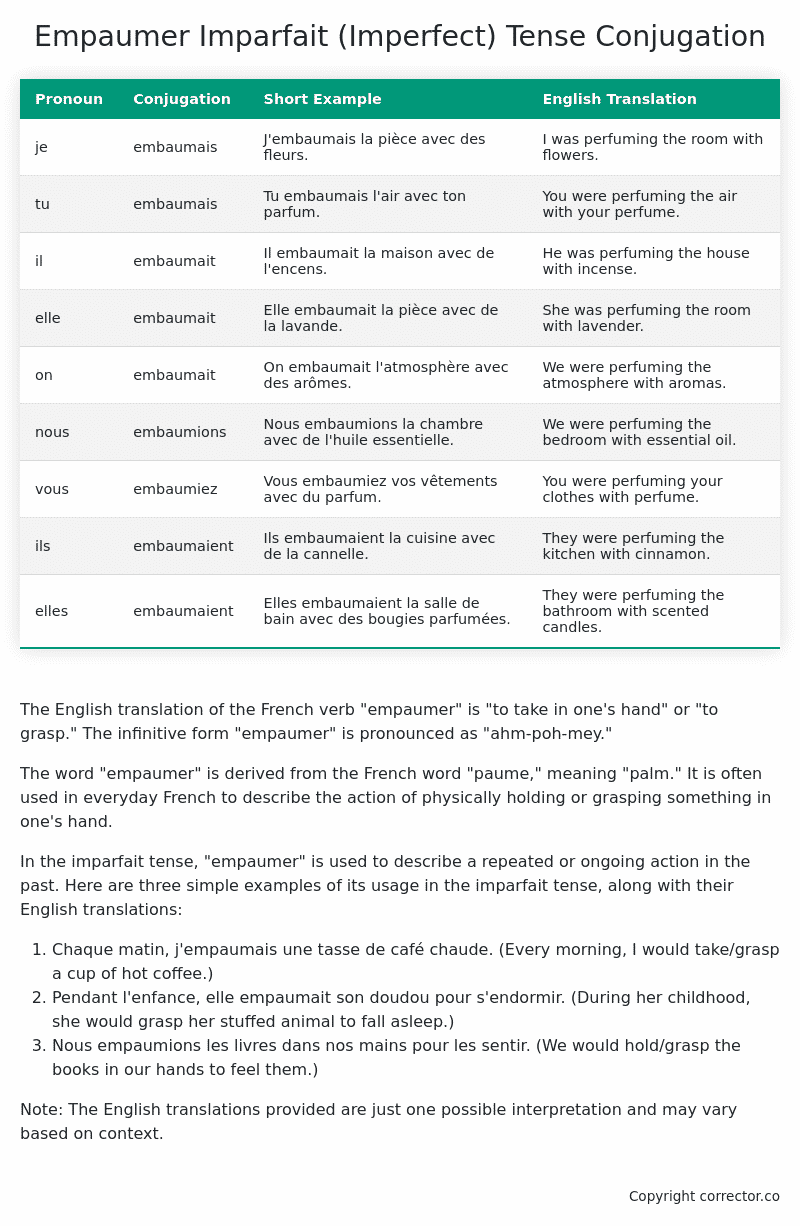Imparfait (Imperfect) Tense Conjugation of the French Verb empaumer
Introduction to the verb empaumer
The English translation of the French verb “empaumer” is “to take in one’s hand” or “to grasp.” The infinitive form “empaumer” is pronounced as “ahm-poh-mey.”
The word “empaumer” is derived from the French word “paume,” meaning “palm.” It is often used in everyday French to describe the action of physically holding or grasping something in one’s hand.
In the imparfait tense, “empaumer” is used to describe a repeated or ongoing action in the past. Here are three simple examples of its usage in the imparfait tense, along with their English translations:
- Chaque matin, j’empaumais une tasse de café chaude. (Every morning, I would take/grasp a cup of hot coffee.)
- Pendant l’enfance, elle empaumait son doudou pour s’endormir. (During her childhood, she would grasp her stuffed animal to fall asleep.)
- Nous empaumions les livres dans nos mains pour les sentir. (We would hold/grasp the books in our hands to feel them.)
Note: The English translations provided are just one possible interpretation and may vary based on context.
Table of the Imparfait (Imperfect) Tense Conjugation of empaumer
| Pronoun | Conjugation | Short Example | English Translation |
|---|---|---|---|
| je | embaumais | J’embaumais la pièce avec des fleurs. | I was perfuming the room with flowers. |
| tu | embaumais | Tu embaumais l’air avec ton parfum. | You were perfuming the air with your perfume. |
| il | embaumait | Il embaumait la maison avec de l’encens. | He was perfuming the house with incense. |
| elle | embaumait | Elle embaumait la pièce avec de la lavande. | She was perfuming the room with lavender. |
| on | embaumait | On embaumait l’atmosphère avec des arômes. | We were perfuming the atmosphere with aromas. |
| nous | embaumions | Nous embaumions la chambre avec de l’huile essentielle. | We were perfuming the bedroom with essential oil. |
| vous | embaumiez | Vous embaumiez vos vêtements avec du parfum. | You were perfuming your clothes with perfume. |
| ils | embaumaient | Ils embaumaient la cuisine avec de la cannelle. | They were perfuming the kitchen with cinnamon. |
| elles | embaumaient | Elles embaumaient la salle de bain avec des bougies parfumées. | They were perfuming the bathroom with scented candles. |
Other Conjugations for Empaumer.
Le Present (Present Tense) Conjugation of the French Verb empaumer
Imparfait (Imperfect) Tense Conjugation of the French Verb empaumer (You’re reading it right now!)
Passé Simple (Simple Past) Tense Conjugation of the French Verb empaumer
Passé Composé (Present Perfect) Tense Conjugation of the French Verb empaumer
Futur Simple (Simple Future) Tense Conjugation of the French Verb empaumer
Futur Proche (Near Future) Tense Conjugation of the French Verb empaumer
Plus-que-parfait (Pluperfect) Tense Conjugation of the French Verb empaumer
Passé Antérieur (Past Anterior) Tense Conjugation of the French Verb empaumer
Futur Antérieur (Future Anterior) Tense Conjugation of the French Verb empaumer
Subjonctif Présent (Subjunctive Present) Tense Conjugation of the French Verb empaumer
Subjonctif Passé (Subjunctive Past) Tense Conjugation of the French Verb empaumer
Subjonctif Imparfait (Subjunctive Imperfect) Tense Conjugation of the French Verb empaumer
Subjonctif Plus-que-parfait (Subjunctive Pluperfect) Tense Conjugation of the French Verb empaumer
Conditionnel Présent (Conditional Present) Tense Conjugation of the French Verb empaumer
Conditionnel Passé (Conditional Past) Tense Conjugation of the French Verb empaumer
Conditionnel Passé II (Conditional Past II) Tense Conjugation of the French Verb empaumer
L’impératif Présent (Imperative Present) Tense Conjugation of the French Verb empaumer
L’impératif Passé (Imperative Past) Tense Conjugation of the French Verb empaumer
L’infinitif Présent (Infinitive Present) Tense Conjugation of the French Verb empaumer
L’infinitif Passé (Infinitive Past) Tense Conjugation of the French Verb empaumer
Le Participe Présent (Present Participle) Tense Conjugation of the French Verb empaumer
Le Participe Passé (Past Participle) Tense Conjugation of the French Verb empaumer
Struggling with French verbs or the language in general? Why not use our free French Grammar Checker – no registration required!
Get a FREE Download Study Sheet of this Conjugation 🔥
Simply right click the image below, click “save image” and get your free reference for the empaumer imparfait tense conjugation!

Empaumer – About the French Imparfait Tense
NOTE: To take a deep dive into all the French tenses then see our article on Mastering French Tense Conjugation.
Formation of the Imparfait Tense
For regular -er verbs:
For regular -ir verbs
For regular -re verbs
Common Everyday Usage Patterns
Description of Past Habits
Background Information
Mental and Emotional States
It’s employed to express emotions, thoughts, or physical sensations in the past. For example: “J’étais content quand il est arrivé.” (I was happy when he arrived.)
Ongoing Actions
Points to Note About the Imparfait Tense
Passé Composé vs. Imparfait
Conditional
Si Clauses
Narration
I hope you enjoyed this article on the verb empaumer. Still in a learning mood? Check out another TOTALLY random French verb imparfait conjugation!


